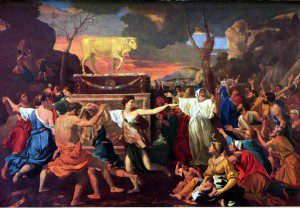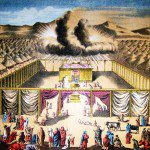In the last post, I began retelling Israel’s story from the perspective of honor and shame. (Click here: Part 1). The emphasis falls more on how God honored Israel. Today, we see the shift to shame.
 From Grace to Disgrace
From Grace to Disgrace
Even from their time in the wilderness, the people of Israel brought disgrace upon themselves.
Psalm 106:19–21 is especially vivid,
They made a calf in Horeb and worshiped a metal image. They exchanged the glory of God for the image of an ox that eats grass. They forgot God, their Savior, who had done great things in Egypt,… (cf. Rom 1:23; Jer 2:11).
Their rebellion was a rejection of the Lord, whom they despised (cf. Numb 11:20; 14:23). The leaders did not glorify him before all the people (Lev 10:1–3).
They used social and political convention to mask their shame. For example, they dishonored the Lord when they sought to have a human king, like the other nations (1 Sam 8:7; 10:19). They refused to honor the Lord as the one true God and only King over them.
Not surprisingly, when people behave shamefully and pursue the praise of others (rather than the Lord), they will not find what they seek. Such a people turn against themselves. After Solomon’s reign, the nation was divided and suffered under civil war.
In the process, they squander their hope of glory by turning to idols. Israel did not heed Jeremiah’s warning,
Every man is stupid and without knowledge; every goldsmith is put to shame by his idols, for his images are false, and there is no breath in them. They are worthless, a work of delusion; at the time of their punishment they shall perish (Jer 10:14–15).
The Shame of Exile
 At this point in the story, most people focus on the plight of Israel. Deuteronomy 28–30 anticipates the consequences of Israel’s shameless behavior. She would now find herself languishing under God’s curse.
At this point in the story, most people focus on the plight of Israel. Deuteronomy 28–30 anticipates the consequences of Israel’s shameless behavior. She would now find herself languishing under God’s curse.
What few people pay attention to is the predicament in which God seems now to find Himself. God’s own honor is called into question by the unfaithfulness of his people. This is true from two perspectives.
(1) Although Israel had known the Lord is the one true Creator God, they nevertheless turned away from Him. What does it say to a watching world when this people––who had experienced the radical power and grace of God in the exodus––now preferred to worship the gods of the nations?
(2) God had promised to use Abraham’s family to bless the entire world. Yet, here they are––spurning God. How could they be a blessing to the world when they now were under the curse of the Law? How can God maintain his righteousness by keeping His promises?
We see a far more serious problem in the exile. It marks an egregious affront to God’s honor. Not doubt this is why Paul (in Rom 2:24) quotes Isa 52:5, where God days,
“Their rulers wail,” declares the LORD, “and continually all the day my name is despised.”
It is for this reason that Israel suffers the shame of alienation, which manifested in their exile. In Isaiah 42:17, the prophet writes,
They are turned back and utterly put to shame, who trust in carved idols, who say to metal images, “You are our gods.”
Notice how Jeremiah describes the events surrounding the exile,
We are put to shame, for we have heard reproach; dishonor has covered our face, for foreigners have come into the holy places of the LORD’s house. (Jer 51:51)
Sadly, not all the exiles had repented of their most fundamental sin. Therefore, in Mal 1:6–7 God rebukes his people:
A son honors his father, and a servant his master. If then I am a father, where is my honor? And if I am a master, where is my fear? says the LORD of hosts to you, O priests, who despise my name. But you say, “How have we despised your name?” By offering polluted food upon my altar. But you say, “How have we polluted you?” By saying that the LORD’s table may be despised.
According to Ezra, the mere returning to their homeland did not remove Israel’s shame:
And for our iniquities we, our kings, and our priests have been given into the hand of the kings of the lands, to the sword, to captivity, to plundering, and to utter shame, as it is today. But now for a brief moment favor has been shown by the Lord our God, to leave us a remnant and to give us a secure hold within his holy place, that our God may brighten our eyes and grant us a little reviving in our slavery. (Ezra 9:7b–8)
This readies us for the next part in the series, when we shall see the hope of restored honor, which was proclaimed by Israel’s prophets.
Photo credit: Creative Commons 2.0/en.wikipedia.org













